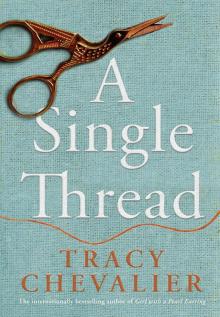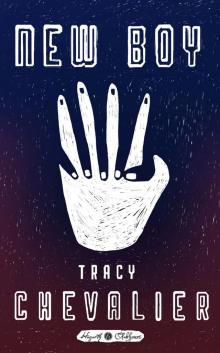- Home
- Tracy Chevalier
New Boy Page 13
New Boy Read online
Page 13
Maybe it was because Ian was leaving her alone. Since Monday morning by the flagpole when she had agreed to be his girlfriend, she had felt his attention pressing on her like a heavy quilt pinning her to the bed. Even out of sight he somehow made his presence felt—either by the persistent attention his friend Rod paid her, keeping tabs on her for Ian, or by the way the playground functioned around him: the kids who followed him or feared him or ignored him running in distinct motions like a machine in which Ian was the center. Briefly Mimi had been pulled into that center with him, and it was so alien a place that she could barely function—as a student, as a girlfriend, as a friend. Buying her freedom from him with the strawberry pencil case had been worth it for the feeling she’d had during kickball that she was now insignificant. Ian’s attention had shifted to others, and Mimi could breathe again, could close her eyes and find her own place far from scrutiny.
But she felt guilty: she knew instinctively that nothing good would come of Ian now being in possession of that case—and Osei’s address and phone number. She regretted not thinking to remove the piece of paper before handing it over. Most of all she felt guilty for betraying Dee by giving away something precious of hers. It was disloyal.
She sighed. At least I can help Dee now—that’s something, she thought as she linked her arm through her friend’s and walked her upstairs to see the nurse.
Miss Montano’s office on the second floor was a small box of a room, with a bathroom attached and the transistor radio permanently tuned to WPGC, the local Top 40 station. They had all been there before to see Miss Montano for cuts and stomachaches and fevers. Mimi was a regular with her headaches. The door was ajar, and over the sound of “Band on the Run” on the radio, Mimi could hear whimpers and the nurse’s admonishment to “stop being a baby.”
She and Dee sat down to wait in a row of chairs set out in the hall. Across from them, posters had been taped to the wall. A reminder to wash your hands after using the bathroom. How to deal with hair lice. The signs for chicken pox, mumps, measles. Posters about having a TB test, an eye test, a shot for smallpox or polio. Just sitting across from all this adult information exhausted her. They were good at making the world into a fearful place. For a second she wished her mother were sitting with them, to take over the burden of worry.
More yelps were heard from the office. A scraped knee, Mimi predicted, which Miss Montano would be cleaning with iodine. Probably a young student, a second or third grader. She had sat here so many times that she had heard it all before.
Dee was leaning back, eyes closed. Mimi wanted to ask how she was doing; in fact, there were many things she wanted to ask, and to say. But she knew from experience with headaches that fussing didn’t help. Instead she tried to be practical. “I’m going to get some water. Do you want some?”
“Yes, please.”
Mimi pulled two Dixie Riddle Cups from a dispenser on the wall and went to the water fountain down the hall to fill them. When she got back, “Reelin’ in the Years” by Steely Dan was playing and Dee was crying. Mimi sat down and handed her the cup. “Drink.”
Dee drank in one gulp, then crushed the paper cup without reading her riddle. Mimi sipped hers, glancing at the joke on the side of the cup. What does a mirror do when you tell it a joke? It cracks up. They were never funny.
“Right,” she said. “I’m going to rebraid your hair. One braid or two?”
“One.”
“French braid?”
“French. No—normal. Make it simple.”
“Turn your back.”
Dee turned away from Mimi, who sat sideways in her seat and pulled her friend’s hair over her shoulders. She began combing the thick blond tresses with her fingers to calm and tame them. She had rarely seen Dee’s hair free from braids. It seemed a shame to confine it again. Still, it clearly bothered the adults.
Mimi divided Dee’s hair into three. “Now, tell me what’s wrong,” she said as she began weaving the strands in and out.
“Oh…” Dee shook her head. “It’s nothing.”
“It’s not nothing. What happened out there?” Mimi had been sitting with her eyes closed, willing herself far from the playground, and had only caught the end of Dee’s fall, the smack of her head against the ground, but she’d seen the ugly fury in Osei’s face and knew Dee could not have tripped as she’d claimed.
“I don’t know why he’s mad at me.” Dee wiped her eyes with a hand. “I don’t know what I’ve done. Everything was so great, and then…suddenly it wasn’t. It’s like a switch has been flipped, like someone said something to him about me. But what would anyone say? I haven’t done anything wrong! Except…”
“What?”
Dee shook her head. “Nothing.”
When it became clear she would not elaborate, Mimi shook her own head. “Boys are strange.”
“Are you and Ian—”
“We just broke up.” Mimi thought of the exchange—strawberry case for breakup—and a pang of guilt twisted her stomach. She should tell Dee. Did she have the nerve to?
Dee turned to look at Mimi. “Oh! That’s—” She appeared to gulp back a word, but she seemed relieved—which hurt Mimi more than she’d expected. Clearly her judgment had been in question, even if Dee hadn’t said anything about it these past few days.
“That’s good,” Mimi filled in. “I know. I don’t know what got into me to go with him in the first place.”
“Well…” Dee smiled for the first time. “We kind of wondered. He’s so different from you.”
“I guess I was flattered. No boy has wanted to go with me before. Because I’m weird.”
“No, you’re not!”
“Yes, I am. You know I am. I’ve always been on the sidelines. I’m not very good at anything. I don’t get good grades, I can’t run fast, I can’t draw or write or sing. I get these silly headaches. Everyone thinks I’m a witch or something. Sometimes I’m amazed that I’m your best friend.” Especially when I give your things away and lie to you, she added silently.
“Don’t be silly, you’re the most interesting person I know—apart from Osei, now.”
Mimi felt the sharp tooth of jealousy bite, and was tempted to yank hard on the braid she held. Instead she reeled herself in and, giving the braid only a gentle tug, she announced, “There. Do you have a ponytail holder?”
Dee dug into her jeans pocket. “You’re also very good at turning Double-Dutch ropes,” she said, handing Mimi a purple elastic.
Mimi wasn’t sure how serious Dee was and decided it must be a joke. She laughed. “Yes, I am good at that.” She dropped the braid. “Done.”
“Thanks.” Dee leaned her head back against the wall, then winced and shifted to rest her cheek against her hand. “Hurts.”
“The bump?”
“Yeah.”
“You hit it pretty hard. Do you feel dizzy or sick?”
“No.”
“Good. That probably means you don’t have a concussion. That’s what the nurse will be worried about.”
They were silent. Now was the moment when Mimi should confess to her friend about the pencil case. She swallowed, opened her mouth—but nothing came out. It was so hard to admit to bad behavior. And with her hair back in a braid, Dee looked calmer, more herself. Mimi was reluctant to upset her.
Then another song came on, and the moment was gone. Mimi and Dee sat up.
I heard he sang a good song
I heard he had a style
And so I came to see him
To listen for a while
Even the tinniness of the radio couldn’t disguise Roberta Flack’s rich voice. The girls had been crazy about the song ever since it came out over a year ago. A fifth grade girl with a strong voice had won the school’s talent show this year with it, though Mimi had overheard Mr. Brabant mutter to Miss Lode that it was a wholly inappropriate song for a ten-year-old to sing. Dee began to hum along.
Strumming my pain with his fingers
Singing my life
with his words
Killing me softly with his song…
She broke off. “Oh, Mimi, I don’t know what to do.”
“Do you like Osei?”
“Yes. A lot. It felt so good being with him. He’s so different from anyone else here.”
Mimi was silent, trying not to take it as a criticism.
“He’s been so many places and has things to say. He makes everyone else seem boring. And me boring too, living in this boring suburb. It makes me want to do more adventurous things, like go downtown more often. When was the last time you went into DC?”
“Easter—we took my cousins up the Washington Monument.”
“I was going to ask Osei to take the bus with me this weekend—to Georgetown, maybe.”
“What about your mother?”
“What about her?” The defiance Dee had displayed earlier with Mr. Brabant was rearing up again.
“Never mind. You can say you’re with me if you want.”
“I won’t need to if he stays mad at me. I feel like we have to make up or break up.”
“Did he push you just now?”
Dee didn’t answer.
“ ’Cause if he did, that’s bad, isn’t it?”
“It was an accident. He didn’t mean to hurt me, I’m sure.”
“Are you?”
“I’m more worried about how he acted with me before that, during the kickball game, and even before that. Why did he change so fast? Seem to care, then suddenly so angry and distant?”
Mimi shrugged. “I don’t understand boys. And they don’t understand us.”
“Ow!” they heard inside; then, “Jimmy, I’m almost done. Sit still!”
He sang as if he knew me
In all my dark despair
And then he looked right through me
As if I wasn’t there
Dee was crying again. Mimi knew it was best to leave her alone.
Maybe she could get the strawberry case back from Ian before he did anything with it—sold it or whatever he was planning. She would steel herself and ask him.
There were scuffles in the office, and Dee managed to wipe her eyes before the door swung wide and a young boy limped out, patched up on his knee and elbow, followed by Miss Montano, who wore a white coat and a face set permanently to unperturbed.
“Back you go to class, Jimmy,” she said. “Next time look where you’re going. Honestly—boys,” she muttered, before turning to Mimi and Dee. “All right, then, girls. Another headache, Mimi?”
“No, Miss Montano, I’m just accompanying Dee. Miss Lode asked me to. She’s bumped her head.”
“Have you? Dee, come in and I’ll look you over.” She nodded at Mimi. “You can go back to class. If nothing’s wrong, Dee can see herself back. If she’s hurt herself, I’ll send her home.” Miss Montano’s briskness was comforting, as responsibility was deftly removed from Mimi. Let the adults take charge.
She squeezed Dee’s hand. “See you later.”
Dee nodded and rose to follow the nurse inside. “Thanks, Mimi.”
“Sure.”
Mimi remained seated after they had gone inside, waiting for Roberta to finish singing out her pain, wondering what the next song would be and if it would provide a sign. She didn’t tell Dee and the others, but she looked for signs in things sometimes if she was confused. Her brain was fizzing now; she needed to feed it with knowledge that would make sense of the day.
When Dr. John began to sing about being in the right place at the wrong time, Mimi nodded. The sign made sense to her: this whole day felt like the wrong time. She couldn’t wait for it to be over.
My mommy told me
If I was goody
That she would buy me
A rubber dolly
My sister told her
I kissed a soldier
Now she won’t buy me
That rubber dolly
Now I am dead
And in my grave
And there beside me
A rubber dolly
Dee was relieved when the bell rang for the end of school. She felt as if she’d been waiting for it for hours. When she’d returned from the nurse, having missed the grammar test, Osei did not smile when she sat down, and he ignored her for what was left of the afternoon. She could feel the ice on him as they sat side by side during Art, making Mother’s Day cards from construction paper, magazines, tissue paper, glitter, pipe cleaners, and other materials distributed to the desk clusters. It was particularly painful when someone was sitting right next to you as they froze you out.
Art was class time Dee had always looked forward to, when Mr. Brabant stepped out and Mrs. Randolph took over and everything became softer and less rigid. You could talk to your friends while your hands were busy. Mrs. Randolph encouraged it. “We create best when we are relaxed and free,” she said, waving her hands so that her myriad bangles jingled. She always wore bright red lipstick that bled over her lips into the web of tiny wrinkles surrounding them. “Light. And passion. That is what we’re looking for. Comme les Français.” Mrs. Randolph had been to Paris several times and liked to remind the students by sprinkling French throughout her pep talks.
She wanted them to make unusual cards for their mothers, not just a drawing of flowers with “Happy Mother’s Day, Mom” printed inside. “Look at all these things you can use for your cards,” she said. “Feel them.” She threw the tissue paper in the air, riffled through magazines, waved vials of silver glitter. “Be inspired. Think about your mother and all that she does for you,” she added as the students looked blank. “How much she loves you and how much she has sacrificed for your happiness. Express the love you have for her on this piece of paper.” She held one of the white cards she had distributed. “Express yourself and honor your mother. Ah, l’amour pour la mère, c’est merveilleux!”
Dee giggled nervously and glanced sideways at O. He did not look up. His face was stern, his eyes glued to his card. Dee bit her lip and looked across at Patty, who pouted sympathetically. “How’s your head?” she asked pointedly, frowning at O, as if to remind Dee that she should be angry at him.
Next to her, Osei flinched.
It was a timely reminder. She should be angry—she had a right to be. He had pushed her, hurt her unfairly. He should be saying he was sorry. She should be glaring at him, insisting on changing seats so she didn’t have to sit with him—maybe move across to Casper’s empty seat at the next cluster. Other girls would do that. Blanca would be noisy with it, and enjoy the fuss she could legitimately make.
Yet Dee did not feel angry, but guilty—like she should be apologizing to him rather than the other way around. He had a right to be angry at her, she felt, to shout and push her away. He was black, and all day they had treated him that way, differently from how they would treat another new student. Dee knew she herself found him interesting because he was black, and that was not necessarily a good reason—to like someone for their skin color. She watched his hands now, the brown of her dad’s morning coffee, using scissors to cut out a shape from red construction paper that looked like a lopsided heart. His fingernails were long and square and very pink.
“Dee?”
Patty was staring at her, and Dee jumped. “I’m fine. My head is all right.” She quickly picked up a blue pipe cleaner without knowing what to do with it.
“Who do we have here?” Mrs. Randolph had fluttered over to their desks. “You must be new. I’m sure I would have remembered you otherwise!” She smiled down at O. There was lipstick on her large front teeth.
Osei stopped cutting but did not look up. “Yes, ma’am.”
Mrs. Randolph laughed. “Oh, no need to be formal with me! What’s your name?”
“Osei.”
“What an interesting name! Well, Osei, you can call me Kay.” Mrs. Randolph was always trying to get the students to call her by her first name. No one ever did. “There is no hierarchy here. There never is in art. There is just expression. And today we are expre
ssing our love and respect for our mothers. What are you making for your card to her?”
Dee wanted to tell him not to worry, that Mrs. Randolph paid this sort of embarrassing attention to everyone at some point. You just had to grit your teeth and let it wash over you, then once she’d moved on you could sit back and laugh at her behind her back. But of course Dee couldn’t say such a thing, not with him so clearly shutting her out.
He looked up at Mrs. Randolph and said, “I am cutting out strawberries for her. They are her favorite fruit.”
Dee’s stomach curdled. Mrs. Randolph clapped her hands. “Formidable! Choosing something specific to her—that’s wonderful! Now, don’t be constrained by the materials here. You don’t even have to use scissors if you don’t want to. You can tear out the strawberries from the paper if you like! Do you want to tear them out?” Clean lines seemed to bother Mrs. Randolph much more than messiness.
Osei looked down and began cutting again. “I am using scissors.”
“Of course, of course!” Mrs. Randolph shrilled nervously. “Super! Now, Dee, what are you doing? How will you celebrate your mother?”
“I—I—” Dee fiddled with the pipe cleaner she held, curling it in on itself so that it became a fuzzy circle. She had no idea what to make for her mother. Mrs. Benedetti was not the sort of mother you “celebrated.”
“Blueberries!” Mrs. Randolph cried. “Is that your mother’s favorite fruit? Maybe this will be the fruit table. Osei, you are setting a trend!” She gazed expectantly at Duncan’s and Patty’s cards, hoping perhaps to see bananas depicted, or oranges. But Duncan was asleep with his head on his arms; while Mr. Brabant would never have allowed Duncan to sleep in class, Mrs. Randolph was more lenient. Patty was painstakingly constructing a tissue-paper flower that the girls had learned to make the year before with another, more traditional art teacher. For a moment Mrs. Randolph looked as if she wanted to pluck the flower from Patty and rip it up. Instead she smiled brightly and turned to another cluster of desks. “And what will we find here? Favorite vegetables?” She let loose her crashing laugh and Dee winced.

 Girl With a Pearl Earring
Girl With a Pearl Earring A Single Thread
A Single Thread Reader, I Married Him: Stories Inspired by Jane Eyre
Reader, I Married Him: Stories Inspired by Jane Eyre The Last Runaway
The Last Runaway Burning Bright
Burning Bright Remarkable Creatures
Remarkable Creatures At the Edge of the Orchard
At the Edge of the Orchard The Virgin Blue
The Virgin Blue The Lady and the Unicorn
The Lady and the Unicorn Falling Angels
Falling Angels New Boy
New Boy Reader, I Married Him
Reader, I Married Him Girl with a Pearl Earring, The
Girl with a Pearl Earring, The